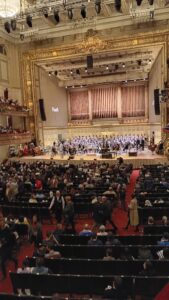What’s a concert review doing in this blog on writing? Well, it’s increasingly become a blog on whatever I think people will enjoy reading about, so why not? I’ve blogged about accompanying silent movies, and incidental music for a play isn’t that far removed.
 Symphony Hall in Boston has been the site of a lot of great experiences for me. Some are faded in my memory. It’s likely that there’s one which, if you could remind me of it, would make me say, “Of course! Nothing could top that!” Right now, though, I can’t name one that was more breathtaking than last night’s presentation of Peer Gynt.
Symphony Hall in Boston has been the site of a lot of great experiences for me. Some are faded in my memory. It’s likely that there’s one which, if you could remind me of it, would make me say, “Of course! Nothing could top that!” Right now, though, I can’t name one that was more breathtaking than last night’s presentation of Peer Gynt.
It wasn’t a full presentation of the play; that, combined with Grieg’s music, would take four or five hours. However, it was much more than the two orchestral suites that are usually all we hear of the music. It was an adaptation with staging, costumes, and a full chorus. I arrived early for the pre-concert talk, which included Bill Barclay, who created this version of Ibsen’s play. His aim was to restore some of the context of Grieg’s music and allow the performance of more than the pieces in the suites. It adapted the original freely and included a few intentional anachronisms.
The presentation extended beyond the stage. The singer-actors were sometimes out on the floor in front. The voice of the Boyg, an invisible, formless being, came from the back of the hall. In one scene, lightning flashes filled the hall. I had a first row balcony seat, which I prefer to an orchestra seat. You can see more from there. It gave a fine view, but being close to the stage would have been quite an experience.
A few highlights:
Georgia Jarman’s singing as Solveig was wonderful. The Boston Symphony Orchestra was excellent, as usual.
After Peer met the Troll King’s daughter, the orchestra played the familiar “In the Hall of the Mountain King.” I wondered what would happen; surely at least someone would enter. But the music just kept building its crescendo, increasing the tension; then, at the climax, the chorus burst in fortissimo, representing trolls who wanted to kill Peer. It was stunning.
In the play, when Peer is threatened by the unseen Great Boyg, church bells save him. In this performance, he had a still more potent channel of divine power: the Symphony Hall organ.
There was some dancing, but the performers were obviously chosen for their singing and acting abilities. It was the right choice.
Getting to Boston involved the usual inconveniences with the MBTA. The B, C, and D branches of the Green Line were out of service. Fortunately, it’s the E branch that goes to Symphony Hall. (Sorry, Duke, you can’t “Take the A Train” in Boston; there isn’t one.) The concert was easily worth the trip.